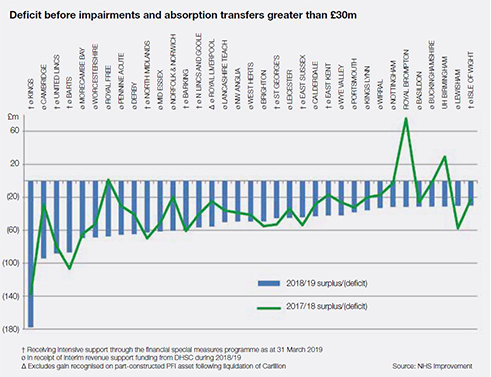NHS in numbers: providers
We may be moving towards system working, but providers – both NHS trusts and foundation trusts – remain major players in the achievement of the NHS long-term plan.
The service ended 2018/19 with 227 providers in total and twice as many foundation trusts (150) as trusts (77). This followed some minor reconfiguration during the year with the dissolution of two trusts and one foundation trust, following acquisitions by foundation trusts.
So, NHS Improvement’s Consolidated NHS provider accounts 2018/19 reports that there were 230 NHS providers in existence during the year.
Of these 230 providers, 133 acutes accounted for 75% of the overall sector’s £85bn turnover (up from £81bn the previous year). Some 53 mental health trusts shared a further 15%, with the remainder split across 10 ambulance trusts, 17 specialist trusts and 17 community trusts.
The acute sector was also primarily responsible for the sector’s overspend. Acute providers’ £1.3bn deficit was offset by a net surplus of £416m across mental health trusts, £209m for specialist trusts and a combined £78m for ambulance and community trusts. In total, this delivered a £575m overall provider sector deficit.
Not all acute providers made a deficit and not all non-acutes were in surplus. Of 106 providers reporting a deficit for the year (before impairments and transfers), 88 were acute, seven mental health, three each for ambulance and community and five specialist.
The gross deficit of all providers in deficit was £2.7bn – up from the £2.4bn recorded by 101 deficit trusts in 2017/18. Ten of the most financially challenged trusts are in the financial special measures programme and made up 26% of the reported gross deficit. (See figure below for trusts with deficits greater than £30m.)
There were a total of 124 trusts that made a surplus or broke even.
The overall financial position of the sector benefited from £2.45bn of funding from the Provider Sustainability Fund (PSF). Access to the fund depended on providers accepting and achieving a financial control total, 92 of which were set below break-even (after PSF).
Some 201 providers accepted their control totals in 2018/19, and 149 of these met or exceeded their full-year control total and received their full entitlement of PSF income. A further 43 providers received part of their initial PSF allocation and eight providers didn’t meet their control total at any point in the year but benefited from a general distribution of the fund.
In addition, three providers received PSF funding where their integrated care system exceeded its system plan, but the providers did not accept an individual control total.
Related content
The Institute’s annual costing conference provides the NHS with the latest developments and guidance in NHS costing.
The value masterclass shares examples of organisations and systems that have pursued a value-driven approach and the results they have achieved.